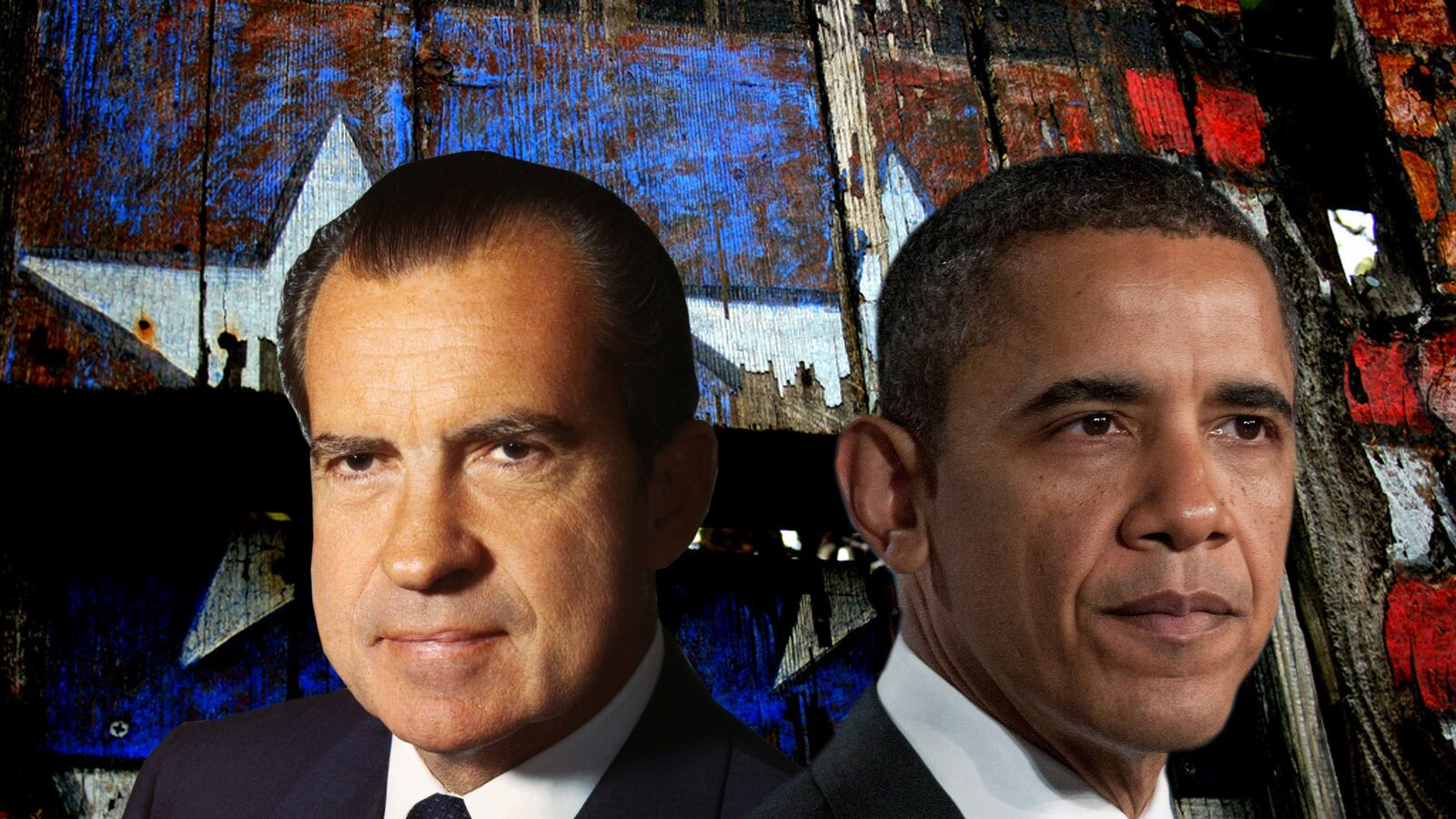The Vietnam War dominated the presidential campaign of 1968. The North Vietnamese Tet Offensive was launched on January 30, in the middle of the primary battle. A month later, shortly before the war forced President Johnson out of the race, a UPI reporter interviewed Nixon and wrote: “Former Vice President Richard M. Nixon vowed Tuesday that if elected president, he would ‘end the war’ in Vietnam. He did not spell out how.”

Despite Nixon explicitly saying a few weeks later that he had “no gimmicks or secret plans” for the war, soon there was talk of Nixon’s “secret plan” to end the war. As Walter Wells later wrote in the International Herald Tribune: “Even though Richard Nixon didn’t have one, the notion that he had a secret plan to end the Vietnam war helped him win the presidency in 1968.”
Fast forward to 2009. President Obama is trying to sell his health-care plan. He knows the majority of Americans who have health insurance are satisfied with their coverage and that the new plan could be seen as threatening. Unlike Social Security and Medicare, which were new programs, Obamacare would be supplementing and replacing current systems.
So to answer that concern, the president could not have been clearer. On June 5, 2009, he told the American Medical Association: “And if you like your insurance plan, you will keep it. No one will be able to take that away from you. It hasn’t happened yet. It won’t happen in the future.”
He went on to repeat his promise many times. “The president’s pledge that ‘if you like your insurance, you will keep it’ is one of the most memorable of his presidency,” wrote Glenn Kessler, The Washington Post’s fact checker, on Wednesday.
The problem was, the promise wasn’t true, and within a few days of the first pledge, the Associated Press challenged its credibility. In that story, officials sought to walk back the president’s remarks: “White House officials suggest the president’s rhetoric shouldn’t be taken literally: What Obama really means is that government isn’t about to barge in and force people to change insurance.”
OK, that’s reasonable. And had the president changed his rhetoric accordingly, all would be well. But he didn’t. Instead, despite his own White House admitting it wasn’t accurate, Obama kept repeating the same promise, and as late as this week, Valerie Jarrett, his closest adviser, was tweeting, “Nothing in #Obamacare forces people out of their health plans.”
When you repeat something of substance you know not to be true, you’re lying. And that’s the simple reality: one of “the most memorable” promises of the Obama presidency was simply a lie.
Why did he do it? The obvious answer is probably the correct one: he didn’t tell the truth because he feared the consequences of telling the truth. If people knew they might lose their coverage, it would have made the Affordable Care Act more difficult to pass. And like a lot of falsehoods, once you start, it’s hard to stop.
What Obama did was far more deliberate than Nixon’s obfuscation on Vietnam. Nixon at least never claimed to have a “secret plan,” though to the degree that he was seen as having a plan, he no doubt benefited.
But Obama simply repeated a direct and clear lie in direct and clear terms over and over.
It’s shouldn’t be a shock that we have a president who doesn’t tell the truth. We’ve had them before. What is shocking is the degree to which Obama was able to bluff his way past voters and the media.
Until the last week, he was never directly asked at a press conference about his claims. There were no questions about his famous “you can keep it” promise in the 2012 debates.
Why? Once again, the obvious answer is probably correct. The press has a tendency to believe Obama and, for the most part, until recently, has been predisposed to believe that Obamacare is a positive development.
Again, a Vietnam analogy is apt. It’s often forgotten that what we now call the “mainstream media” was largely neutral to supportive of the war in Vietnam in the early days. It wasn’t until August 1967 that The New York Times declared in a front-page analysis “the war is not going well. Victory is not close at hand.” And it wasn’t until February 27, 1968, that Walter Cronkite uttered his famous line that the U.S. military “was mired in stalemate.”
The Cronkite line is credited, perhaps apocryphally, with causing Johnson to say, “If I’ve lost Cronkite, I’ve lost Middle America.”
It’s been an operating assumption of the majority of the press that Obamacare would help more than it would hurt. That may prove to be accurate, or it may not, but the inability to imagine otherwise has often framed the discussion on Obamacare. If the president said, “if you like your insurance, you will keep it,” then he must have known what he was talking about. Except he was lying.
After Vietnam, it was axiomatic that the press would approach those in power with a skepticism verging on cynicism. The writers and editors who came of age in Vietnam and Watergate had a fundamental mistrust that anything a government official asserted was true.
That was often frustrating to every administration, Democrat or Republican, but it was not an entirely unhealthy dynamic. Many in the press were skeptical of the Bush claims of WMD as a justification for war with Iraq. When no weapons of mass destruction were found, the immediate assumption was that President Bush had lied.
There is no question that the war in Iraq deeply reinforced skepticism of the credibility of the government. When Obama emerged, there seemed to be an eagerness to cast aside that cynicism and embrace the possibility that the new candidate was truly different. It’s as though there was a fundamental shift, and reporters and editors, most of whom were too young to have covered Vietnam or Watergate, allowed themselves to fall in love with the ideals that the candidate and president espoused.
In many ways, this was a return to the sort of coverage that often existed pre-Vietnam. It wasn’t just JFK whom reporters loved. They respected Eisenhower, and many gave him the benefit of the doubt. He had, after all, saved the world.
Then the horrible mendacity of the Vietnam War, with its body counts and “Five O’Clock Follies” press briefings, changed all that. It was probably inevitable the mistrust would fade and a new generation would emerge to be disillusioned.
So now we know the president doesn’t tell the truth. The next question is, how much will it matter to the media and the public?






